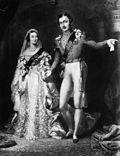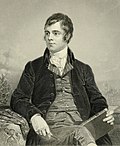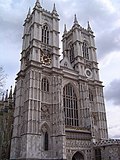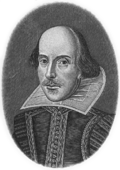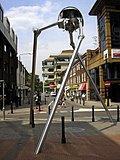Portal:United Kingdom
The United Kingdom Portal
 |
 |
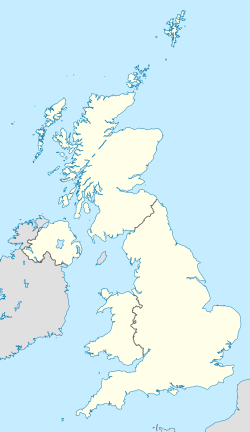
| |
The United Kingdom of Great Britain and Northern Ireland, commonly known as the United Kingdom (UK) or Britain, is a country in Northwestern Europe, off the coast of the continental mainland. It comprises England, Scotland, Wales and Northern Ireland. The UK includes the island of Great Britain, the north-eastern part of the island of Ireland, and most of the smaller islands within the British Isles, covering 94,354 square miles (244,376 km2). Northern Ireland shares a land border with the Republic of Ireland; otherwise, the UK is surrounded by the Atlantic Ocean, the North Sea, the English Channel, the Celtic Sea and the Irish Sea. It maintains sovereignty over the British Overseas Territories, which are located across various oceans and seas globally. The UK had an estimated population of over 68.2 million people in 2023. The capital and largest city of both England and the UK is London. The cities of Edinburgh, Cardiff and Belfast are the national capitals of Scotland, Wales and Northern Ireland respectively.
The UK has been inhabited continuously since the Neolithic. In AD 43 the Roman conquest of Britain began; the Roman departure was followed by Anglo-Saxon settlement. In 1066 the Normans conquered England. With the end of the Wars of the Roses the Kingdom of England stabilised and began to grow in power, resulting by the 16th century in the annexation of Wales and the establishment of the British Empire. Over the course of the 17th century the role of the British monarchy was reduced, particularly as a result of the English Civil War. In 1707 the Kingdom of England and the Kingdom of Scotland united under the Treaty of Union to create the Kingdom of Great Britain. In the Georgian era the office of prime minister became established. The Acts of Union 1800 incorporated the Kingdom of Ireland to create the United Kingdom of Great Britain and Ireland in 1801. Most of Ireland seceded from the UK in 1922 as the Irish Free State, and the Royal and Parliamentary Titles Act 1927 created the present United Kingdom.
The UK became the first industrialised country and was the world's foremost power for the majority of the 19th and early 20th centuries, particularly during the Pax Britannica between 1815 and 1914. The British Empire was the leading economic power for most of the 19th century, a position supported by its agricultural prosperity, its role as a dominant trading nation, a massive industrial capacity, significant technological achievements, and the rise of 19th-century London as the world's principal financial centre. At its height in the 1920s the empire encompassed almost a quarter of the world's landmass and population, and was the largest empire in history. However, its involvement in the First World War and the Second World War damaged Britain's economic power, and a global wave of decolonisation led to the independence of most British colonies. (Full article...)
Featured article
The Moors murders were carried out by Ian Brady and Myra Hindley between July 1963 and October 1965, in and around what is now Greater Manchester, England. The victims were five children aged between 10 and 17, and at least four of them were sexually assaulted. The murders are so named because two of the victims were discovered in graves dug on Saddleworth Moor (pictured); a third grave was discovered on the moor in 1987, more than 20 years after Brady and Hindley's trial in 1966. The body of a fourth victim is also suspected to be buried there, but as of 2010, it remains undiscovered. The investigation was reopened in 1985, after Brady was reported in the press as having confessed to two of the murders. Brady and Hindley were taken separately to Saddleworth Moor to assist the police in their search for the graves, both by then having confessed to the additional murders. Hindley later made several appeals against her life sentence, claiming she was a reformed woman and no longer a danger to society, but she was never released. She later died in 2002 at the age of 60. Brady was declared criminally insane in 1985, since when he has been confined in the high-security Ashworth Hospital. He has made it clear that he never wants to be released, and has repeatedly asked that he be allowed to die. (Full article...)
Featured biography
Henry Spencer Moore OM CH FBA (30 July 1898 – 31 August 1986) was an English visual artist. He is best known for his semi-abstract monumental bronze sculptures which are located around the world as public works of art. Moore also produced many drawings, including a series depicting Londoners sheltering from the Blitz during the Second World War, along with other graphic works on paper.
His forms are usually abstractions of the human figure, typically depicting mother-and-child or reclining figures. Moore's works are usually suggestive of the female body, apart from a phase in the 1950s when he sculpted family groups. His forms are generally pierced or contain hollow spaces. Many interpreters liken the undulating form of his reclining figures to the landscape and hills of his Yorkshire birthplace.
Moore became well known through his carved marble and larger-scale abstract cast bronze sculptures, and was instrumental in introducing a particular form of modernism to the United Kingdom. His ability in later life to fulfil large-scale commissions made him exceptionally wealthy. Despite this, he lived frugally; most of the money he earned went towards endowing the Henry Moore Foundation, which continues to support education and promotion of the arts. (Full article...)
General images -
Subportals
WikiProjects
Things you can do
- Visit the British Wikipedians' notice board.
- The noticeboard is the central forum for information and discussion on editing related to the United Kingdom.
- Comment at the British deletion sorting page.
- This page lists deletion discussions on topics relating to the United Kingdom.
Featured pictures
Did you know -

- ... that booing heard after the United Kingdom's entry at the Eurovision Song Contest 1984 was reportedly either a response to past football hooliganism, claims of lip syncing, or alleged plagiarism of the Supremes?
- ... that Elizabeth II's childhood toys at 145 Piccadilly included 30 toy horses and a farm set collected from Woolworths?
- ... that Graham Fraser pioneered cochlear implantation in the United Kingdom?
- ... that when Sarah Jane Baker was released after 30 years, she was the United Kingdom's longest serving transgender prisoner?
- ... that Joanna Cherry showed a printed copy of an Internet meme featuring Lily Hoshikawa during a UK parliamentary committee meeting?
- ... that Phil Fletcher as Hacker T. Dog caused Lauren Layfield to make the "most famous snort" in the United Kingdom in 2016?
In the news
- 29 July 2025 – 2025 New York Peace Conference on Gaza
- United Kingdom prime minister Keir Starmer declares that the UK will formally recognize the State of Palestine should a ceasefire not be achieved by September. (The Telegraph)
- 28 July 2025 –
- Two people are killed and two others are injured, including the perpetrator, in a mass stabbing on business premises on Long Lane in Southwark, London, United Kingdom. (Sky News)
- 25 July 2025 – Online Safety Act 2023
- Thousands of websites begin implementing age verification to block "adult content" for British viewers under the age of 18, according to Ofcom. (BBC News)
- 24 July 2025 – Hungary–Israel relations, Hungary–United Kingdom relations
- Hungary bans Irish rap trio Kneecap for three years ahead of a music festival, citing a national security threat over their alleged support for Hamas and Hezbollah. (The Times of Israel)
- 19 July 2025 –
- In boxing, Ukrainian Oleksandr Usyk defeats British challenger Daniel Dubois at Wembley Stadium in London, England, via a fifth-round knockout to become a two-time undisputed heavyweight champion. (BBC Sport)
- 17 July 2025 –
- The British government announces it will lower the voting age to 16, allowing 16- and 17-year-olds to vote in the upcoming general election. (NPR)
Categories
Other UK-connected Wikipedias
Wikimedia
The following Wikimedia Foundation sister projects provide more on this subject:
-
Commons
Free media repository -
Wikibooks
Free textbooks and manuals -
Wikidata
Free knowledge base -
Wikinews
Free-content news -
Wikiquote
Collection of quotations -
Wikisource
Free-content library -
Wikiversity
Free learning tools -
Wikivoyage
Free travel guide -
Wiktionary
Dictionary and thesaurus



















